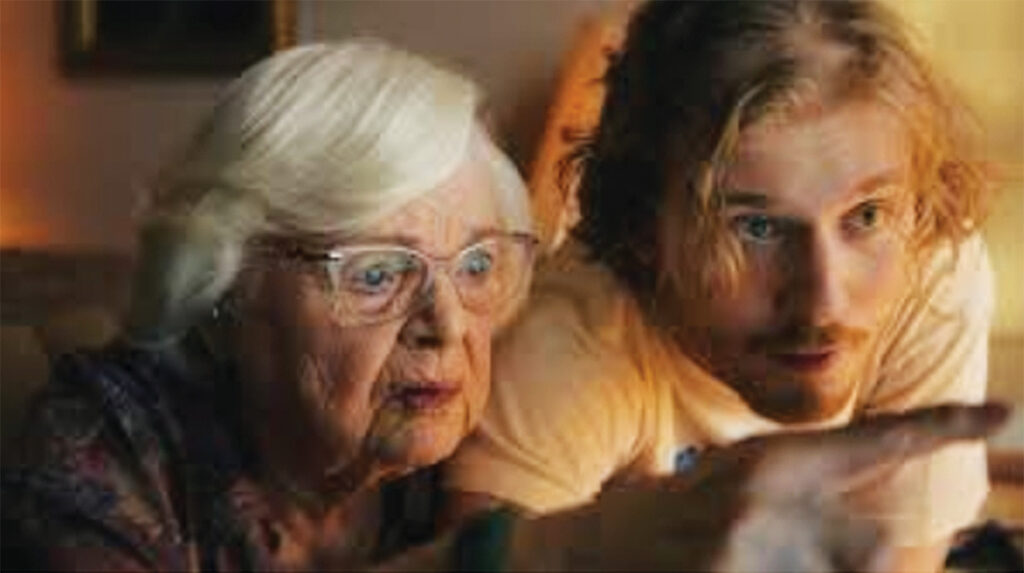
A topical tale seasoned with comedy makes Thelma recommended viewing, blending entertainment with the lessons of being scammed.
Nonagenarian (no worries, I had to look it up too) Thelma Post (June Squibb) lives in Los Angeles near her daughter (played by Parker Posey), her son-in-law (Clark Gregg), and her cherished grandson Danny, delightfully portrayed by young Fred Hechinger. When Thelma receives a frantic phone call that Danny has been arrested and needs $10,000 to retain a lawyer, Thelma panics. And then she posts the payment.
When Thelma learns she was duped, she sinks into a fog of shame for donating $10,000 to a fast-talking crook. But then she finds her note on which she scribbled the address of the private mailbox rental service where she sent the money. Could she possibly track this guy down? Thelma doesn’t even drive, but she doesn’t want to be talked out of her mission. Thelma is a schemer, and her plan is to go it alone while peripherally involving her friend Ben (Richard Roundtree). When Ben insists on joining her, they become a team of two.

Thelma was inspired by a real phone scam that targeted the real Thelma Post, who makes a fleeting cameo as the film ends and is now 103. The film was written and directed by Josh Margolin, the real grandson of the real Thelma. Margolin rolled up his sleeves and grew the instigating event into a more intricate adventure laced with humor and poignancy about the challenges of aging.
Thelma’s 93-year-old leading lady is June Squibb, an actor with a long history on stage and screen. Some of her most remembered films include About Schmidt, opposite Jack Nicholson, and Nebraska, opposite Bruce Dern, for which she was nominated for an Oscar. While her roots are in Illinois, her years spent in Manhattan studying acting and performing on stage explain her New York accent.
Thelma is a complex woman. She’s independent and lives alone. She is kind and witty, and adores her grandson, Danny, who is always in need of confidence and direction. Danny looks out for Grandma and appreciates her assurance that he’ll find his way.
But Thelma is also a handful. Her over-bearing personality and questionable decisions raise eyebrows and ruffle our sympathy. Honestly, the story’s trajectory is a bit overdone. But wait. The film is still a good watch, especially for the one reason I was eager to see it. Even the unlikely possibility of a scammer becoming a scam-mee was enough to get me to the box office. Hear me out.
Remember all those old westerns where the good guys wore white hats, and the bad guys wore black? Well, that’s over. Life and morals are far more complicated now, especially in movies. But Thelma pokes at my inner optimist that longs for a world of justice. The fantasy goes like this: As long as humanity commits deception and crime, every offender will get caught. And repent. And serve time until they vow obedience to the “Do unto others” code of behavior we learned from age three. Yeah. And monkeys might fly.
I remember an incident many years ago when my friend David became a phone target. The caller claimed he was a lawyer who was at the police station aiding David’s grandson James, and was requesting a retainer to proceed. It smelled like a scam, but what if it wasn’t? David is a grounded guy with street smarts. He gave credence to the caller, who was reasonably convincing, while he straddled the line between fact and fake, engaging the caller with questions that needed convincing answers. Finally, David insisted on speaking to the arresting police officer. The caller had met his match, confirmed by the dial tone. Game over. David called his grandson and verified that James was neither at a police station nor under arrest. With persistence and a cool head, David dodged an expensive bullet.
Like so many unsuspecting victims, anyone can fall prey to trickery when the well-being of their loved ones could be at stake. What do we do? Remember that there is safety in numbers. Text your friends or family for advice. If you’re on a cell phone, bring someone you trust into the conversation by adding a third party to the call. And here is where the film parts ways with the instigating event. The real Thelma did receive a scam call, but she didn’t send the money. Why? Because her family wouldn’t let her.
